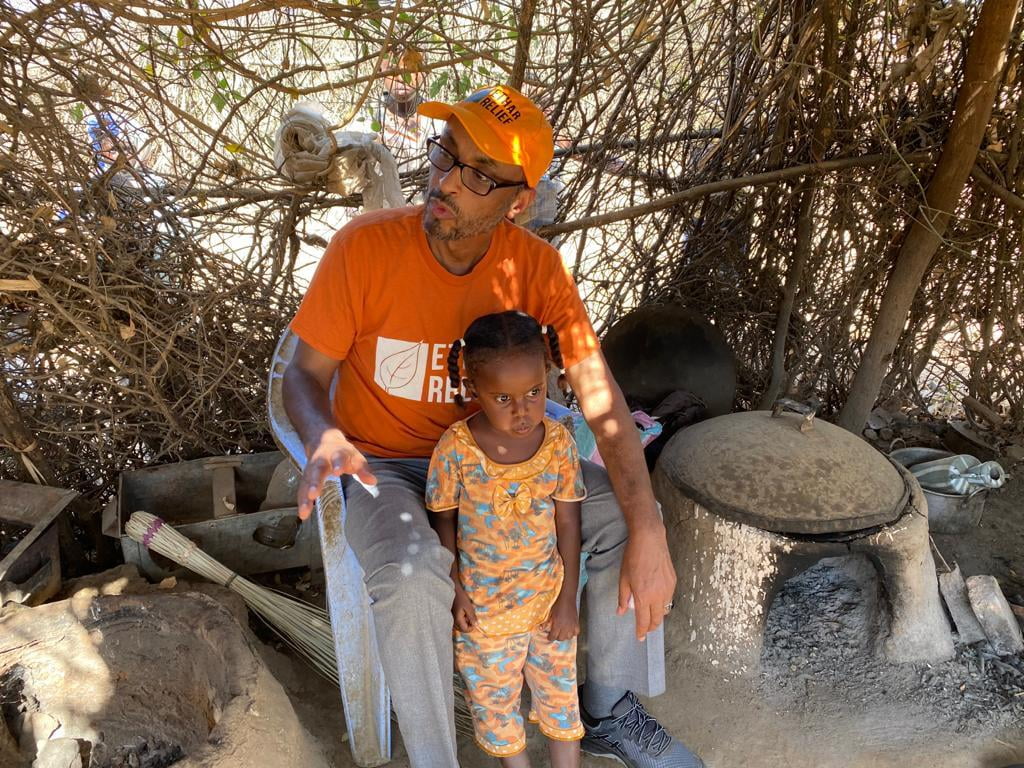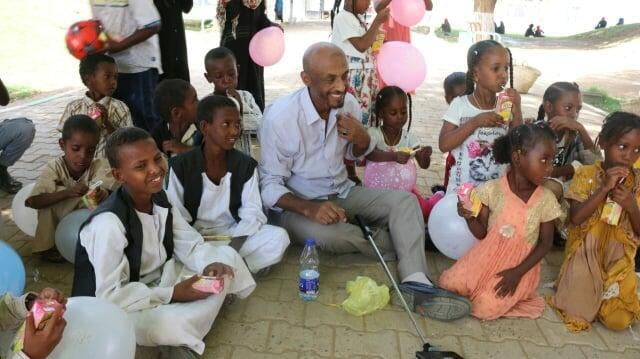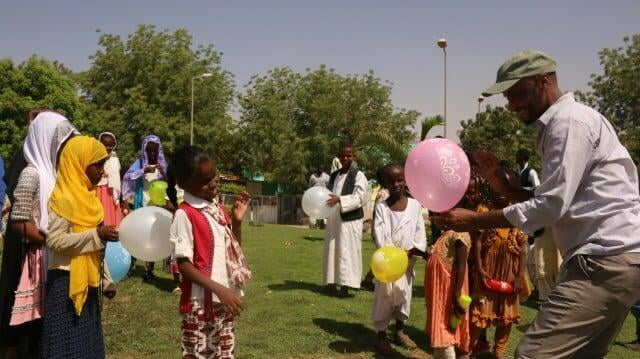What does Ethar stand for?
In the early days, many thought that ETHAR was only an acronym, standing for Eritrea and The Horn of Africa Relief. This is indeed a useful way to describe how we started out and what we do. But the deeper meaning of ‘Ethar’ is actually derived from a word of Arabic origin, meaning altruism, love and affection – the urge to give to others the very best of what you have, or facilitate for another person something better than what you yourself could achieve. Ethar, therefore, literally means selfless giving in the spirit of unconditional love, and symbolises everything Sultan Omar and the entire Ethar Family stands for.
The Story of Ethar
To understand the story of Ethar, we must first understand the life, history, struggles and motivations of its Founder, Mr Sultan Omar.

Born in Eritrea in 1967 in the midst of the conflict with Ethiopia, Sultan Omar grew up in a period of brutal conflict and instability in the country’s history. The year of his birth was the first year that refugees began fleeing his homeland into neighbouring Sudan, terrified by what they witnessed in their own country. He considers his birth date as significant in reminding him about the struggles of those who sought asylum over the border, leaving everything and migrating towards any kind of safety. The young Sultan was not so fortunate to escape in the early years, so he grew up witnessing murder and slaughter on the streets, and the burning and pillaging of entire villages.
Sultan Omar’s early life was punctuated by hardship, loss and mortal danger. He knew only suffering and tribulation, bloodshed, burning of homes, killing of innocent souls, and the wholesale slaughter of people like animals. This is what it meant to be born into a warzone, forgotten by the world. He has memories of only four occasions when he saw his father, before it was confirmed to him that he had become an orphan. His sister, Suad, was killed in early adulthood; a bomb exploded so near to her that no trace of her could be found afterwards.
In his own words:
“When I speak about poverty and hardship I don't speak about something which I have watched on video, described in words or understood in some respect. I have lived it. For a period of time when I had not even reached the age of 13, after my father passed away, I used to try and make a living selling things, taking things from the village and selling them in the city. We were surrounded by devastation. The only option was survival.”

As a teenager in the early 1980s, Sultan Omar began looking for refuge in different places, knowing that he would not survive the conflict in Eritrea. Leaving Eritrea, he ventured to Djibouti, ending up in a location with other refugees for a short time. Having witnessed such horror in his youth, he was determined to consolidate his search for safety and stability. Taking the chance of life or death, he risked crossing the red sea on a small boat, to get to Saudi Arabia. The dangers of such a journey were not lost on him; many who attempted such a journey would drown and their bodies would never be found. The boat, designed for 15 people, was packed with 40. The journey, expected to be 3 days, took a week. With food and water supplies having run out, the travellers submitted to God’s will and eventually, excruciatingly, arrived on the coast of Jazan, Saudi Arabia.
After staying in Saudi Arabia for some time, Sultan Omar found that his most realistic option was to apply for official documented refugee status in Sudan, where many Eritreans were already seeking asylum. Migrating to Sudan in 1982, he stayed until he received his UN refugee passport. Always recognised as a bright student, he got the chance to acquire his foundational education in Sudan and Egypt, and Secondary level education in Qatar. He continued on to Norway, formally applying for Norwegian citizenship, which he acquired in 1987.
Upon his settlement in Europe, Sultan Omar was able to live a normal life, get married and start a family. He named his daughter Suad, after his beloved sister who had died in such tragic circumstances years earlier. This was his anchor – his constant reminder that there were many people left behind in the places from which he had escaped.
Sultan Omar decided to embark upon an incredible mission. He could never – and would never – forget his early years of suffering. He realised that he could not be comfortable and content as long as he knew that there were thousands like him without comfort and safety. He felt strongly that his liberation from the status of a refugee to a citizen afforded him a huge responsibility towards others in the same position as he had been.
Bringing together like-minded people who had experienced similar hardships, Sultan Omar established Ethar with a simple aim: to make a difference to people’s lives and uplift those in need, starting with the refugees who had been completely forgotten by the entire world.
In his own words:
“When I speak about orphans, I don't speak about the stories of orphans that I have watched on videos or heard about. I have experienced and lived what it means to be an orphan. I lost my father at a young age and in reality, I know the true meaning of the word orphan. I know the danger and loss of being a child without safety and protection.”

As you can see, Ethar began in 2006 but in reality its seed was planted even earlier than that. We, as employees, volunteers, and supporters of Ethar, find that every day of our lives is punctuated by inspiration, surprises and uplifting miracles. The incredible passion for humanity exemplified to us by Sultan Omar is the motivating and driving factor behind this – it’s an infectious desire to help, to go above and beyond in providing assistance to those in need, and to never turn away from a request or an emergency. Once we commit to a group of people, we are in their service and will not rest until their dignity and humanity has been faithfully upheld.
The impact of Sultan Omar’s mindset and focus is huge. Every moment that passes fills us with astonishment and wonder at the amazing achievements that sincere, dedicated people can make when they work together for the sake of others. Those of us who follow a faith have seen it strengthen in conviction, and see a divine mercy in the year-on-year increase in generosity and goodwill shown by our supporters.
None of this could be achieved without strong teamwork and sincere partnerships. The core management team established by Sultan Omar are all exponents of that same single-minded attitude and dedication to those in need. There isn’t a quiet period or downtime in the Ethar calendar – as long as we have strength, we will keep working towards our humanitarian goals. This is the only way to turn the tide of suffering and misery that has engulfed the world’s most disadvantaged people.
In addition to hard work and selfless service, Sultan Omar has instilled a supportive, family environment into the Ethar team - wherever we are located in the world. The ‘Ethar Family’ is a concept of respect, support, and mutual values, which provides a constant reminder of our purpose and mission to every member. It is also a source of limitless and unconditional love, celebrating the beautiful phenomenon of people brought together for the sole aim of serving others.
We are in awe of our beloved friends that are located across the world, who have responded to Ethar’s message with all their heart. They have believed in the cause and raised the voice of the forgotten refugees in hearts, homes and communities across the globe. Through them, refugee issues are being noticed, and every year a few more people remember the forgotten.







